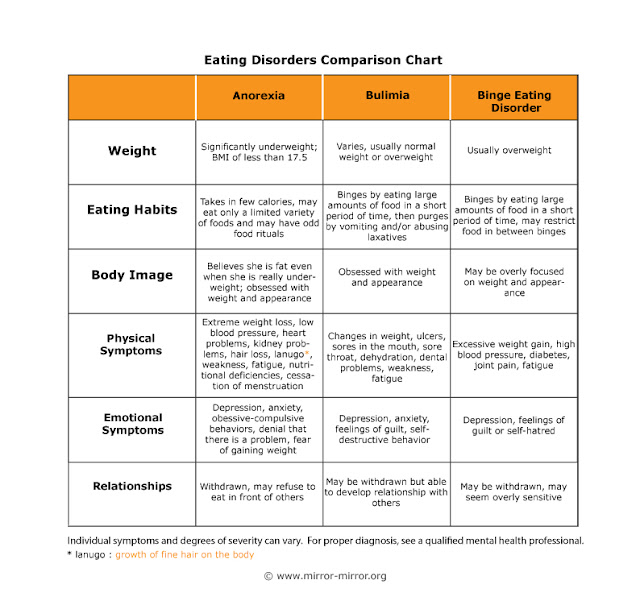WHAT ARE EATING DISORDERS?
Eating disorders are categorized as mental illnesses that severely disrupt life. People with eating disorders are obsessed with food and weight and often disregard everything else in their life. The main types of eating disorders are Anorexia Nervosa, Bulimia Nervosa, and Binge-Eating Disorder. Eating disorders can cause a person extreme physical harm and can potentially even be life-threatening (Mayo Clinic). People with eating disorders generally experience self-critical, negative thoughts and feelings about body weight and food (Kids Health).
WHO IS AT RISK?
Most people affected by anorexia and bulimia are female. Binge-eating disorder affects both males and females. Eating disorders usually appear during the teenage years and young adulthood, but can occur in childhood or late adulthood (NIMH). The cause of eating disorders is unknown but many factors may contribute to the development of eating disorders. These factors may include: genetics/biology, psychological and emotional health, and society.
Biological/Genetic Contributing Factors:
- Genetic predisposition to eating disorders, depression, and anxiety
- Certain personality styles, for example obsessive-compulsive personality type
- Deficiency or excess of certain brain chemicals cal neurotransmitters, especially serotonin (Mental Health America)
Psychological and Emotional Health Contributing Factors:
- Low self-esteem
- Use of food to cope with negative emotions
- History of sexual abuse
- Controlling family in which emotions are not allowed to be expressed (Mental Health America)
Societal Contributing Factors:
- Pressures to be thin (i.e., pressure to lose weight from family and friends)
- Cultural norms of attractiveness as promoted by magazines and popular culture (Mental Health America)
Malnutrition, Death, Heart problems, Multiple organ failure, Depression, Suicidal thoughts or behavior, Absence of menstruation, Bone loss, Muscle atrophy, Dry skin, hair, and nails, Stunted growth, Digestive problems, Kidney damage, Insomnia, Ulcers, Chronic fatigue, Diabetes, Anemia, Osteoporosis, Arthritis, Infertility, Seizures, Severe tooth decay, Low blood pressure (Mayo Clinic)
"The mortality rate among people with anorexia is 12 times higher than the death rate among females ages 15 to 24 from all other causes"
-Mental Health America
TREATMENT OPTIONS
Eating disorders are treatable. The sooner they are diagnosed and treated, the better the outcomes are likely to be. Eating disorders require a comprehensive, long-term treatment plan that usually involves individual or family therapy, and that may include medication and even immediate hospitalization. Unfortunately, many people with eating disorders will not admit they are ill and refuse treatment. Family and friend support is necessary for a proper recovery (Mental Health America).
FIVE DIMENSIONS OF HEALTH
IN RELATION TO EATING DISORDERS
Physical: Eating disorders cause great physical damage to the body, especially when left untreated for a long period of time. Often, eating disorders are not diagnosed which causes the disorder to progress for a long time and lead to further health issues. Some of the major health issues caused by eating disorders include organ failure, suicidal behavior, stunted growth, depression, and potentially death.
Social: Eating disorders are often a result of social pressures. The media portrays that women need to be unnaturally skinny to have any worth. Friends and family also influence the development of eating disorders through words and actions.
Intellectual: Many people do not have the knowledge of the severe effects of eating disorders. If people lack the information about the results of eating disorders, they may face social pressures that lead them to a disorder that can potentially cause them to have severe health issues.
Emotional: One of the potential causes of eating disorders is low-self esteem. If people do not believe they are worth much, then they will not fear the possible outcomes that their bodies may experience if they have an eating disorder. Additionally, people who have families in which emotions cannot be expressed, have a greater chance of developing an eating disorder.
Spiritual: People may not value their well-being for various reasons including a possible lack of faith. this can lead to the development of an eating disorder.





